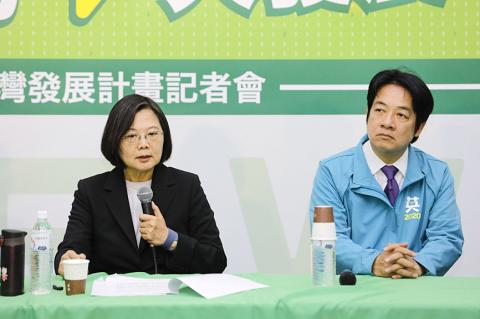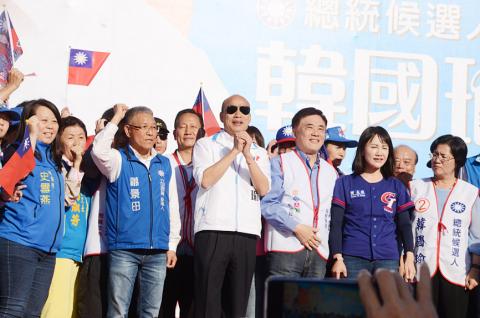President Tsai Ing-wen (蔡英文) yesterday unveiled the Great South, Great Development policy aimed at closing the development gap between southern Taiwan and other parts of the nation.
The policy would focus on the development of industry, agriculture, transportation and tourism in the south and set development goals, thereby demonstrating the Democratic Progressive Party’s (DPP) resolve to bring prosperity to the region, Tsai, who is seeking re-election as the DPP’s presidential candidate in the Jan. 11 election, told a news conference in Kaohsiung.
She was joined by her running mate, former premier William Lai (賴清德), as well as Presidential Office Secretary-General Chen Chu (陳菊), Vice Premier Chen Chi-mai (陳其邁) and DPP Kaohsiung City Councilor Kang Yu-cheng (康裕成), who heads Tsai’s campaign office in the southern city.

Photo: Ko Yu-hao, Taipei Times
Kaohsiung has transformed from an industrial city to a “marine capital,” Tsai said.
She expressed the hope that development levels in the north and south could be balanced with the help of the Executive Yuan’s Forward-looking Infrastructure Development Program, saying that the process must be accelerated.
Although the DPP lost the Kaohsiung mayoral election on Nov. 24 last year, it would not renege on its promise to the city just because there has been a transition of political power, as Kaohsiung has not wronged anyone, she said.

Photo: Yen Hung-chun, Taipei Times
Under the policy, Yunlin County would become the nation’s hub for farming machinery and value-added agricultural and silk products, while Chiayi County would become the headquarters of Taiwan’s tourism, cultural and creative industries, precision machinery and seafood processing.
The policy aims for Tainan to become a high-tech city, while Kaohsiung would become a center of international finance, materials science, marine technologies and circular economy.
Under the policy, Pingtung would focus on the development of agricultural biotechnology, tourism and renewable energy, while outlying Penghu County would set its sights on culture and tourism.
Lai said that the plan would not only balance development in the north and south, promoting unity among Taiwanese, but also solve the problem of “northbound drifting” — a term that refers to people leaving their hometowns in the south to look for work in the north.
Separately yesterday, Kaohsiung Mayor Han Kuo-yu (韓國瑜), the Chinese Nationalist Party’s (KMT) presidential candidate, attended a campaign rally at the Yunlin County Stadium to celebrate the launch of a joint campaign headquarters for him and the county’s KMT legislative candidates.
It was the second time since Thursday that Han visited the county, sparking speculation that he wants to curry favor with local peanut farmers as prices of the legumes are plummeting.
A rumor that began circulating on the Internet last month that the DPP administration plans to import peanuts has driven wholesale peanut prices down from at least NT$40 per kilogram to less than NT$30.
Tsai on Tuesday also visited Yunlin to learn about the peanut price situation.
In related news, a group of veterans who are KMT stalwarts yesterday rallied in Taipei, vowing to use their “expertise in political warfare” to monitor the election and ensure that it is not rigged against Han.
Retired general Chen Chen-hsiang (陳鎮湘), a former KMT vice chairman, called on people to support retired major general Wu Sz-huai (吳斯懷), a KMT legislator-at-large nominee, to prevent the party’s main base of support from “crumbling.”
Wu sparked controversy when he attended a 2016 event in China to commemorate the birth of Sun Yat-sen (孫中山), at which he reportedly listened to a speech by Chinese President Xi Jinping (習近平) and stood for a rendition of the Chinese national anthem.
Additional reporting by Chan Shih-hung and Shih Hsiao-kuang

A Taiwanese software developer has created a generative artificial intelligence (AI) model to help people use AI without exposing sensitive data, project head Huang Chung-hsiao (黃崇校) said yesterday. Huang, a 55-year-old coder leading a US-based team, said that concerns over data privacy and security in popular generative AIs such as ChatGPT and DeepSeek motivated him to develop a personal AI assistant named “Mei.” One of the biggest security flaws with cloud-based algorithms is that users are required to hand over personal information to access the service, giving developers the opportunity to mine user data, he said. For this reason, many government agencies and

The National Fire Agency on Thursday said a series of drills simulating a magnitude 8.5 earthquake would be held in September to enhance the government’s emergency response capabilities. Since earthquakes cannot be predicted, only by continuously promoting disaster prevention measures could Taiwan enhance its resilience to earthquakes, agency Director-General Hsiao Huan-chang (蕭煥章) said in a news release. The exercises would be held to mark annual National Disaster Prevention Day on Sept. 21, the aim of which is to test Taiwan’s preparedness and improve its earthquake resilience in case of a major temblor, Hsiao said. As part of those drills, an earthquake alert would

DEFENSE: The National Security Bureau promised to expand communication and intelligence cooperation with global partners and enhance its strategic analytical skills China has not only increased military exercises and “gray zone” tactics against Taiwan this year, but also continues to recruit military personnel for espionage, the National Security Bureau (NSB) said yesterday in a report to the Legislative Yuan. The bureau submitted the report ahead of NSB Director-General Tsai Ming-yen’s (蔡明彥) appearance before the Foreign and National Defense Committee today. Last year, the Chinese People’s Liberation Army (PLA) conducted “Joint Sword-2024A and B” military exercises targeting Taiwan and carried out 40 combat readiness patrols, the bureau said. In addition, Chinese military aircraft entered Taiwan’s airspace 3,070 times last year, up about

STRICTER ENFORCEMENT: Taipei authorities warned against drunk cycling after a sharp rise in riding under the influence, urging greater public awareness of its illegality Taipei authorities have issued a public warning urging people not to ride bicycles after consuming alcohol, following a sharp rise in riding under the influence (DUI) cases involving bicycles. Five hundred and seven people were charged with DUI last year while riding YouBikes, personal bicycles, or other self-propelled two-wheelers — a fourfold increase from the previous year, data released by the Taipei Police Department’s Traffic Division showed. Of these, 33 cases were considered severe enough to be prosecuted under “offenses against public safety,” the data showed. Under the Road Traffic Management and Penalty Act (道路交通管理處罰條例), bicycles — including YouBikes and other